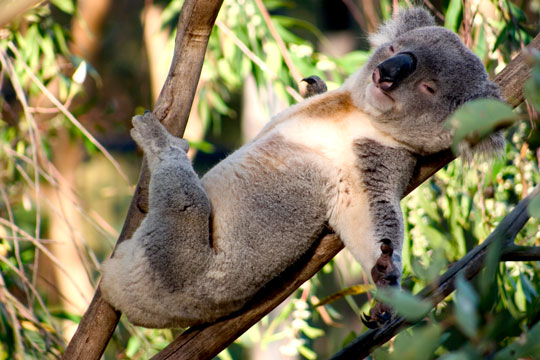No one does it quite like the koala when it comes to catching Z's. This adorable marsupial holds the record for the most sleep, dozing off for 18 to 22 hours a day. But why do koalas sleep so much?
The primary reason koalas sleep so much lies in their diet. Koalas feed almost exclusively on eucalyptus leaves, which are low in nutrients and high in fibrous material and toxic compounds. This diet provides very little energy, so koalas have evolved to conserve energy by sleeping for the majority of the day. Their slow metabolism is a direct adaptation to their low-energy diet, allowing them to spend long hours resting to digest their tough, fibrous meals.
Additionally, eucalyptus leaves contain toxins that require a lot of energy to detoxify, further necessitating long periods of rest. Koalas have a specialized liver that helps in breaking down these toxins, but the process is still energy-intensive, reinforcing their need for extended sleep.
Other Fascinating Facts About Koalas
-
Unique Fingerprints: Koalas are one of the few animals, aside from primates, that have fingerprints. Their fingerprints are remarkably similar to human ones, even under a microscope.
-
Pouch Life: Like other marsupials, koalas carry their young in a pouch. Baby koalas, called joeys, stay in their mother’s pouch for about six months before emerging and clinging to her back for another six months as they continue to develop.
-
Vocalizations: Despite their sleepy demeanor, koalas are quite vocal, especially during the breeding season. Males bellow to attract females and to intimidate other males. These deep, resonant calls can be heard from great distances.
-
Specialized Diet: Koalas eat around 500 grams of eucalyptus leaves daily. They are very particular about the species of eucalyptus they consume, showing a preference for about 30 of the 600 available species.
-
Territorial Animals: Koalas are territorial and have a social structure based on dominance hierarchies. They mark their territory with scent glands located on their chest.
Other Animals with Similar Sleeping Patterns
While koalas hold the record for the most sleep, several other animals also have impressive sleep habits. Here are a few:
-
Sloths: Sloths are renowned for their slow movements and extended sleep, clocking in around 15 to 20 hours of sleep per day. Their low-calorie diet, consisting primarily of leaves, requires them to conserve energy similarly to koalas.
-
Brown Bats: Brown bats sleep for about 19.9 hours a day. They are nocturnal, hunting insects at night and spending the daylight hours sleeping to conserve energy.
-
Giant Armadillos: These nocturnal creatures sleep up to 18 hours a day. Their slow metabolism and the need to conserve energy for nighttime foraging and digging contribute to their lengthy sleep periods.
-
Opossums: Opossums also have extended sleep patterns, resting for around 18 hours daily. They are nocturnal and their diet, which includes a variety of fruits, insects, and small animals, doesn’t require them to be very active during the day.
The Importance of Sleep in the Animal Kingdom
Sleep plays a crucial role in the lives of animals, much like it does in humans. It helps with energy conservation, repair and regeneration of tissues, consolidation of memory, and maintenance of cognitive functions. For animals like koalas and sloths, extended sleep is a necessary adaptation to their specific diets and lifestyles.
Conservation and Awareness
Koalas are currently facing significant threats from habitat loss, climate change, and disease. Efforts are being made globally to protect their habitats and support conservation initiatives. Understanding koalas' unique needs and behaviors can help create effective conservation strategies that ensure these fascinating creatures continue to thrive in the wild.
Understanding the intricacies of animal behavior, including sleep, can provide insights into the broader ecological dynamics and the importance of each species within their environment.
